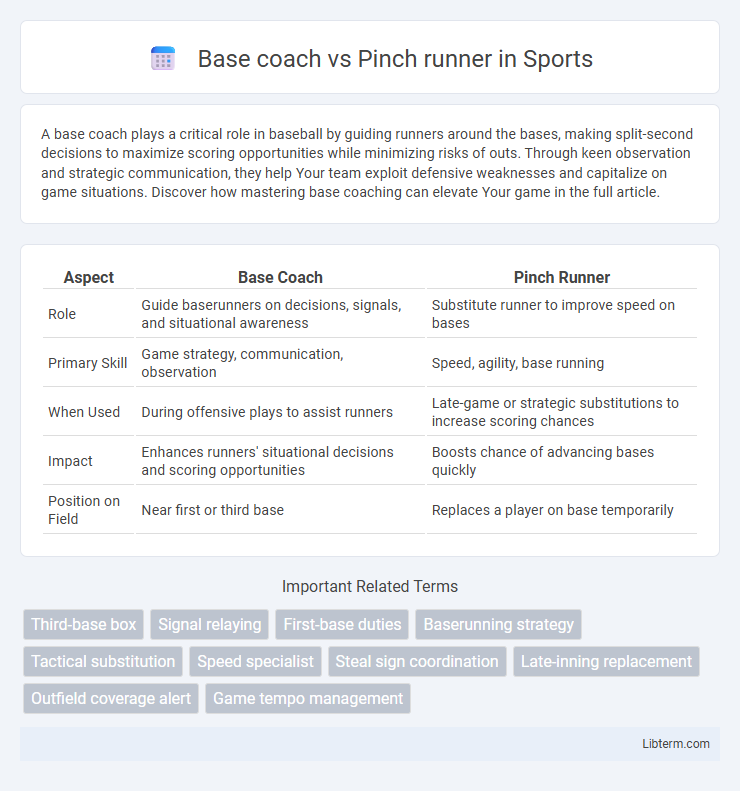A base coach plays a critical role in baseball by guiding runners around the bases, making split-second decisions to maximize scoring opportunities while minimizing risks of outs. Through keen observation and strategic communication, they help Your team exploit defensive weaknesses and capitalize on game situations. Discover how mastering base coaching can elevate Your game in the full article.
Table of Comparison
| Aspect | Base Coach | Pinch Runner |
|---|---|---|
| Role | Guide baserunners on decisions, signals, and situational awareness | Substitute runner to improve speed on bases |
| Primary Skill | Game strategy, communication, observation | Speed, agility, base running |
| When Used | During offensive plays to assist runners | Late-game or strategic substitutions to increase scoring chances |
| Impact | Enhances runners' situational decisions and scoring opportunities | Boosts chance of advancing bases quickly |
| Position on Field | Near first or third base | Replaces a player on base temporarily |
Introduction to Base Coach and Pinch Runner Roles
A base coach guides baserunners during a baseball game, offering strategic signals to enhance scoring chances and avoid outs. A pinch runner, substituted for another player on base, is typically faster to increase the likelihood of advancing or scoring. Both roles are critical in optimizing team performance and situational gameplay.
Key Responsibilities of a Base Coach
A base coach plays a critical role in guiding baserunners by signaling when to advance, hold, or slide, ensuring optimal decision-making during gameplay. They analyze pitcher tendencies, defensive positioning, and game context to communicate strategic cues that maximize scoring opportunities. Unlike a pinch runner whose sole responsibility is to replace a player on base with speed, the base coach actively manages baserunning tactics throughout the game.
Essential Duties of a Pinch Runner
A pinch runner's essential duties include entering the game to replace a base runner, aiming to improve the team's scoring chances through superior speed and base-running skills. Unlike a base coach, who directs players on running strategy and positioning from the dugout, the pinch runner physically performs base stealing, advancing bases, and scoring, often in high-pressure situations. Their role is critical for maximizing offensive opportunities when a faster, more agile runner is needed on the bases.
Skill Sets: Base Coach vs Pinch Runner
A base coach requires keen situational awareness, strategic decision-making skills, and clear communication abilities to effectively guide runners and influence gameplay. In contrast, a pinch runner excels in speed, agility, and base-running intelligence, often specializing in stealing bases and scoring from challenging positions. Both roles demand acute baseball instincts but prioritize different skill sets aligned with their unique responsibilities on the field.
Strategic Importance in Game Play
A base coach enhances offensive strategy by providing real-time signals to runners about when to steal, advance, or hold, optimizing base running efficiency and scoring opportunities. A pinch runner contributes by substituting a faster or more skilled runner in critical moments to increase the likelihood of scoring or avoiding outs. Both roles strategically impact game tempo and run production, with base coaches influencing decision-making and pinch runners executing speed-based tactics.
Communication and Signal Usage
Base coaches use a combination of hand signals and verbal cues to communicate real-time instructions to batters and base runners, ensuring safe and strategic advancement around the bases. Pinch runners rely primarily on quick, discreet signals from base coaches or managers to time their steals or scoring attempts, emphasizing clear and concise communication to avoid confusion. Effective signal usage between base coaches and pinch runners is crucial for maintaining synchronization and maximizing game strategy under high-pressure situations.
Impact on Team Dynamics
A base coach enhances team dynamics by providing strategic guidance, improving baserunner decision-making, and increasing scoring opportunities through situational awareness. A pinch runner contributes by injecting speed and aggression on the bases, often shifting momentum and creating pressure on the opposing defense. Both roles are critical for optimizing offensive efficiency and maintaining a dynamic, adaptable team strategy.
Training and Qualifications Required
Base coaches require extensive knowledge of game strategy, player positioning, and situational awareness, often gained through years of playing or coaching experience. Training emphasizes communication skills and the ability to quickly interpret live game scenarios to signal players effectively. Pinch runners need exceptional speed, agility, and base-running instincts, typically developed through rigorous sprint and sprint-endurance training, with less focus on extensive baseball strategy knowledge.
Common Situations for Utilization
Base coaches are commonly utilized to guide baserunners during strategic moments such as approaching a steal or judging whether to advance on a hit, providing real-time signals from the dugout to optimize baserunning efficiency. Pinch runners are frequently deployed in high-stakes scenarios requiring immediate speed, such as late innings with a close score, to replace slower players and increase the chances of scoring or stealing bases. Both roles strategically enhance offensive opportunities by improving baserunning decisions and speed in crucial game situations.
Comparing Contributions to Team Success
Base coaches provide strategic guidance, such as signaling steal attempts and positioning runners effectively, directly influencing offensive plays and overall team coordination. Pinch runners contribute by injecting speed and agility during crucial moments, enhancing scoring opportunities and defensive pressure on opponents. Both roles uniquely impact team success, with base coaches shaping game tactics and pinch runners offering instantaneous game-changing potential.
Base coach Infographic

 libterm.com
libterm.com